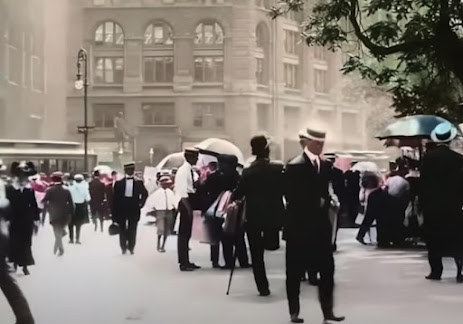"When the West Marched East"
NATO's expansion, Russia's "scorched earth"
and the historical rift in between...
by Bill Bonner
Poitou, France - "Headline report at Bloomberg: "If the US Exits Niger, the Terrorists and Russians Win." "Emmanuel Macron, announced on television that he will pull out the roughly 1,500 French troops stationed in Niger, as well as the French ambassador. France, as the region’s former colonial power, has long played the lead for Team West in the Sahel, with the US in the unaccustomed role of understudy."
Dear readers may be wondering: what do we care? But they may be the key to understanding our future. US foreign policy is controlled by a cabal of arms producers, glory seekers and useful idiots. It costs…all in…about $1.5 trillion per year to support them. That’s about a quarter of all federal spending. And $1 trillion of that cost could easily be cut – with no loss to US security.
That…and relatively minor adjustments to America’s runaway ‘transfer’ payments…could bring the federal budget into balance and prevent a catastrophic debacle of inflation, bankruptcy and banana republic-ism. In preview…we don’t think it is going to happen. But today…we explore further; maybe we’ll see something we missed.
More Question Marks: In the Bloomberg piece above, we are urged to ‘do something’ lest we ‘lose Niger.’ Since Niger is neither something ‘we’ ever had…nor something ‘we’ ever wanted, losing it does not seem like a pressing problem…nor do we expect to spend a lot of time looking for it. So, let us reach into our bag of question marks: why not let the Russians have it?
Talk about dogsh*t countries! Niger has a GDP of about 1/1000th the size of the US. In purchasing power parity, the typical citizen earns about $100 per month. And the government’s budget is about half made up of foreign aid (typically, much of that ends up supporting sellers of top end Swiss watches and German autos).
Let’s take out another question mark. What possible advantage would be bestowed on the US by throwing its money around in Niger? Of course, the same question mark could be used elsewhere. Why does the US have military bases in Germany? The Germans can take care of themselves. Why in Japan? And why send billions to the Ukraine (much of that slips into Swiss bank accounts and Mercedes dealers too!)?
At one level, the question marks are unnecessary. We know the story. After the Iraq/Afghanistan misadventures wound down, America’s war industry needed a new enemy. Over a period of years, it goaded Russia into playing the part. This was not an easy thing to do. Russia has always had an uneasy relationship with Europe…sometimes admirer and imitator…sometimes fighting for its life against ‘the West.’ A little history might help clarify.
From Russia With Love: At the end of the 17th century, Peter, Tsar of Russia, later to be known as “the Great,” arrived in England. He came with four chamberlains (assistants), three interpreters, two clock makers, a cook, a priest, 70 soldiers, four dwarfs and a monkey.
Peter wanted to learn all he could about England and Europe (he stopped in Germany on his way home) so that he could apply the lessons in Russia. It is said that Peter wanted his mission to be secret so that he wouldn’t be bothered by diplomatic niceties. But it is hard for us to imagine how he – who was 6’ 8” tall – and his curious entourage could have remained very long in London without being noticed. This was the beginning of Russia’s efforts to westernize itself, which continued off and on for the next 300 years.
During this time, the Russians’ affection for things European was interrupted thrice – each time by the Europeans themselves. Hardly had Peter returned to Moscow when Charles XII of Sweden fell upon the Baltic coast, marched through Poland and invaded Russia in 1708. Blocked by Peter’s army, the Swedes were unable to advance on Moscow, so they turned towards the Ukraine. Again, Peter was able to out-maneuver them, and beat Charles XII decisively at the battle of Poltava in 1709.
The winning tactic was to withdraw in the face of the more powerful enemy and to destroy everything and anything that he might be able to use. “Scorched earth,” it is called. It is not very popular with local populations, but was effective against the Swedes, and later against the French in 1812, and the Germans in 1941.
From the historical record, invaders come to Russia from ‘the West,’ about once every hundred years. And since the last invasion happened 82 years ago, it might make sense for the Russians to take precautions. This was, arguably, the motivation for Vladimir Putin’s insistence that ‘the West’ take seriously his security concerns.
Instead, NATO did a ‘drang nach osten’ of its own…bringing the immense firepower of ‘the West’ closer and closer to Russia’s front door. In 2014, the US helped a coup d’etat in Kyiv, which replaced an elected Russian-friendly president with one more in tune with the western agenda.
Bullies and Busybodies: This must have been a big disappointment to Putin. After the fall of the Berlin Wall, with assurances from western leaders that NATO would not advance a single inch towards Mother Russia, the Kremlin leadership had once-again wanted to join Europe, not to fight it. European countries were far richer and more technologically advanced than Russia. The Russians hoped to emulate them, not to make war on them. Former NATO chief, George Robertson even says that Putin asked to join NATO. The Guardian reports:
"George Robertson, a former Labour defense secretary who led Nato between 1999 and 2003, said Putin made it clear at their first meeting that he wanted Russia to be part of western Europe. “They wanted to be part of that secure, stable, prosperous west that Russia was out of at the time,” he said. The Labour peer recalled an early meeting with Putin, who became Russian president in 2000. “Putin said: ‘When are you going to invite us to join Nato?’ Russia was never allowed to join. Instead, ‘the West’ marched east. Every warning issued by Putin…and every attempt to find a non-violent solution…was rebuffed by the US.
Finally, the Russian speaking regions east of the Dnieper sought independence from Ukraine (where their language had been outlawed)…and Russia felt it had to act. More to come…"



























